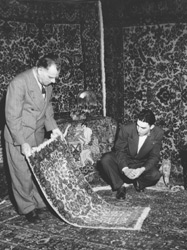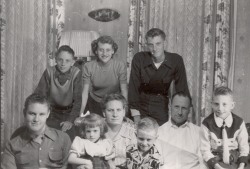Family Values Drive Immigrants’ Success

The chronicle of immigrants coming to this country and starting successful businesses is a quintessentially American one. Many families have stories dating back to the "old country," stories which continue to hold meaning and shape the lives of subsequent generations. While they may change shape over the years, at the hearts of these businesses are often the values that were passed down to them by their fathers and mothers.
The Dream Realized
Many of these businesses could be called the American dream realized, and Demanes Interiors and its sister company, the Oriental Rug Mart, are no exceptions. "Anytime you have a family business that starts out and goes for 90 years, how can you call it anything else but the American dream?" asks Michael Demanes.
After immigrating to the U.S. from Lebanon in the early 1900s, James Demanes put his ties to many of the country's leading Oriental rug importers to work. He and his wife, Mary, began traveling throughout the state of Illinois, selling rugs door-to-door and picking them up for cleaning and repair. In 1919, he built a cleaning plant in the back of his Kewanee house and established James Demanes and Sons, one of downstate Illinois' first full-service Oriental rug businesses. The Peoria storefront opened in the 1950s, with James and his son, Lou, running Peoria's first and only Oriental rug salon.
Lou worked at the shop to help pay for his brothers' college education, but eventually left to study interior design at the Art Institute in Chicago. He expanded the rug business to include furniture, fine linens, silks and figurines. Over the years, the company continued to grow to include contemporary furniture for residential and commercial clients.
In the 1970s, Michael and his brother, Rich, joined the business. "It was like a perfect marriage for my father," says Michael. "He had one son who loved the rugs, and he had one son who loved the design and art." The two businesses are now separate entities, with Michael running the design side at Demanes Interiors, while Rich and his other brother, Jim, operate the Oriental Rug Mart.
Even though Michael has worked for the business for 30 years, he still feels the weight of his family's legacy. "The [survival] statistics from the first generation to the second generation aren't very good...and from the second to the third generation, they drop about 90 percent. That's always been sort of my fear, and my driving force," he confides, "that here I am taking over my grandfather's and father's business, and I don't want to be the one to have it fail."
Keeping family first, Michael has stuck to the same values as his father and grandfather. He remembers the summers when his father would drive to their cabin in Wisconsin to spend the weekend with family. Today, that remains important to the Demanes family. Michael often takes lunch breaks to meet his family at the park, so they can spend part of the afternoon together.
When it comes to the integrity of Demanes Interiors, Michael is uncompromising. When he took over the business, his father pressed him to run it with the same values he and his grandfather did: honesty and accountability. He believes that following through with those is the most important aspect of his business-and his life.
Land of Opportunity
These values led the Demanes family to keep its business small and local, but that's not the path of all family businesses. From its Depression-era origins, when a young German immigrant set out to pursue his own "American dream," founding a masonry company in Morton called Otto Baum and Sons, that company has expanded and evolved into Otto Baum Company, Inc. and Core Construction, companies with national reach and offices across the country.
Otto Baum and Sons was founded in 1937, but its road to success began earlier, and with a great deal of hardship. Otto came to Illinois from Stanendach, Germany, in 1925, when he was just 21. A bricklayer by trade, he worked as a farmhand for another German family that had settled in the area years earlier and paid his fare to the United States. As part of their agreement, he worked on their farm until he could pay the family back for his ticket.
 He paid off his debt in two years, and in 1930, Otto married his wife, Mary. After working his own farm for several years, he began bricklaying chimneys, cisterns and barn foundations for farmers in the area. This work would become a formal company and develop into Otto Baum and Sons, growing to include residential and commercial projects.
He paid off his debt in two years, and in 1930, Otto married his wife, Mary. After working his own farm for several years, he began bricklaying chimneys, cisterns and barn foundations for farmers in the area. This work would become a formal company and develop into Otto Baum and Sons, growing to include residential and commercial projects.
In the decades since, the small business steadily expanded to become the construction giant that it is today. Even with all of these changes, Otto's son, Wayne Baum, says that the business has not changed its core values of "honesty, integrity, fairness and nurturing personal growth...which means taking care of the companies' clients as well as its employees," he says.
Baum also attributes the family's success in equal part to his mother, who supported her husband and children from the beginning. He is reminded of the clothing his mother sewed for his sisters from Purina feed bags, and the impression she left on them about morals and Christian values. The children grew up on a farm, and, therefore, were taught the value of hard work. Otto and Mary Baum also wanted them to learn a trade, and so, in addition to having attended college, all of the Baum sons are trained bricklayers. It was an investment that has paid off many times over for the family.
Success Across Continents
The story of the Baum family is unusual in that few family businesses reach that level of national success. No matter how successful, more often than not, family businesses remain local in scope. The history of Lippmann's Furniture is unique in its own way, as the company was originally founded in the "old country" before making its way to central Illinois. And this history makes for a good story, as told by co-owner Mike Wiesehan.
The business was originally started in Germany by his great-great grandfather, who worked as a cabinet maker. Even today, one of the Moebel Lippmann ("Lippmann's Furniture" in German) retail buildings is still standing in downtown Chemnitz. The building is five stories-four were used to house and sell furniture, while the fifth floor is where the family lived and slept. In addition, one of its manufacturing plants is still standing, where it produced upholstery and cabinets.
Wiesehan's grandfather, M. Walter Lippmann, immigrated to the U.S. and worked in Ohio as a textile engineer, where he met his wife, another German immigrant. They were married in Bloomington, Illinois, but subsequently returned to Europe to help with the family business. Forced out by the charging Russians in World War II, his grandfather's family left what would become East Germany and returned to the United States.
After serving in the military, Lippmann and his family settled in the Peoria area. He worked for several other furniture stores before starting his own business in 1949. According to Wiesehan, the family's long history, values and work ethic influences the store even today. Having survived the Depression and World War II, Lippmann's strives to "offer the customer the best possible service and the best value for their money."
These are just a few examples of the successful, multi-generational businesses started by immigrants to central Illinois. And while each has roots in countries across the globe, they have one thing in common: they are truly American. iBi
Visit peoriamagazines.com/ibi/1999/dec to read "An Interview with Wayne Baum," in which he offers more details about his companies' fascinating history.

